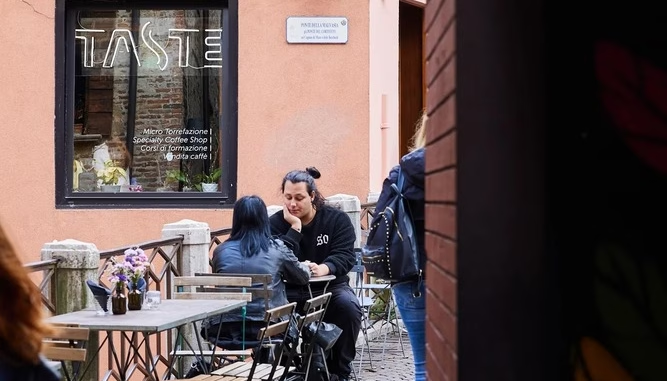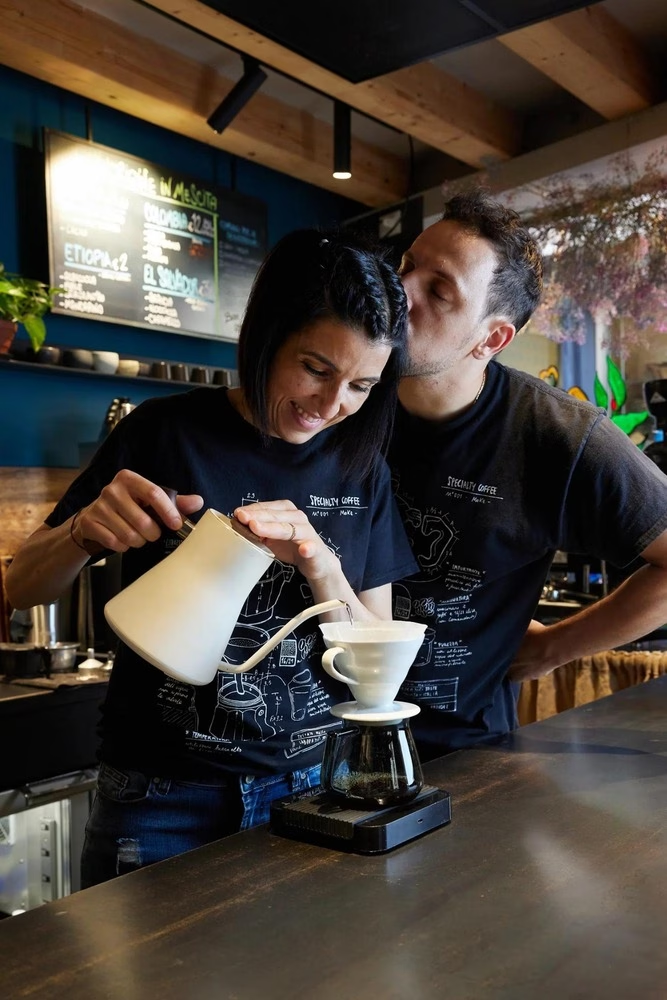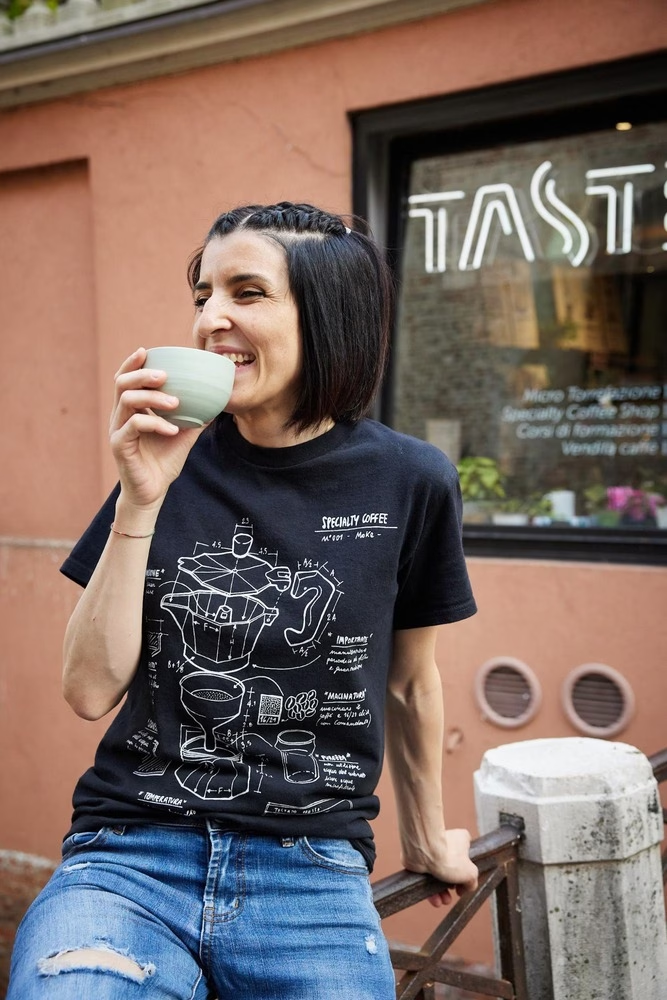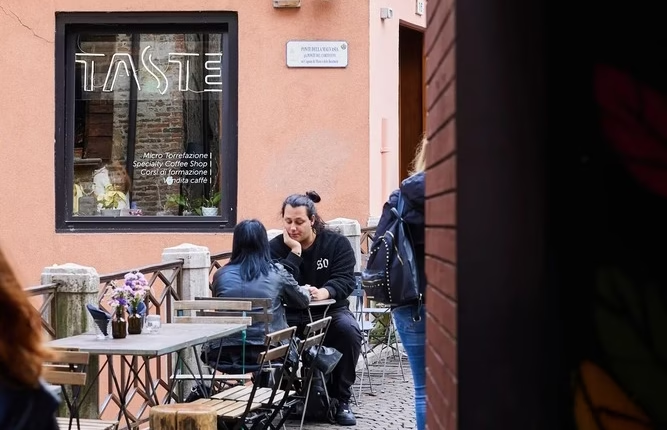Taste Coffee & More: A Labor of Love in the Heart of Veneto, Italy

We deepen our exploration of Italian specialty coffee culture with a look at standout café Taste Coffee & More.
BY ISABELLE MANI
BARISTA MAGAZINE ONLINE
Photos courtesy of Taste Coffee & More
This feature is part of an ongoing editorial series exploring the evolution of Italy’s specialty coffee landscape through conversations with pioneers who are considered among the best in their craft. After a stop in Milan, with Carlos Bittencourt from Cafezal, we now head north to Treviso, in the Veneto region, where a quiet, minimalist sophistication and a distinctive coffee culture have taken root—largely thanks to the work of Elisa Urdich and Fabio Tiralongo of Taste Coffee & More.
Founded in 2017, it was ranked third in the 2024 Barawards—Italy’s most prestigious awards in the hospitality sector—standing out not just among specialty cafés, but across the national scene. This marks the fifth time Taste has appeared on the Barawards list, joining the ranks of celebrated coffee destinations in Milan and Rome—though it couldn’t be more different in concept.


Tucked near the historic Della Malvasia Bridge in Treviso’s ancient city center, Taste Coffee & More is a compact, charming space surrounded by bistros, boutique shops, and local hotspots. The café offers limited seating, and it’s their only venue, closing one day a week and shutting its doors daily at 6 p.m.—a sharp contrast to many of its fellow Barawards-listed cafés, which often serve brunch and transition into late-night aperitivo spots.
With a menu that blends international flavors and local traditions (especially in its handmade pastries and bakery items), Taste has become a beloved destination for locals and international travelers alike, who are easily drawn to its high-quality brews and warm, thoughtful atmosphere.
Elisa gained national and international recognition after winning the 2020 Italian Brewers Cup, but she says that for her and Fabio, success lies in the environment they’ve cultivated. “Welcoming, warm, professional. We love walking people through flavors and origins,” she says. “My Brewers Cup win didn’t shape our business model directly, but it did boost our local credibility.”
Treviso, known as the birthplace of tiramisù, has a refined culinary culture and a deep appreciation for artisanal products, so it’s no surprise that locals came to expect the same level of care in their coffee. Taste’s homemade tiramisù, prepared using their own roasted coffee, is a perfect example.
Elisa and Fabio caught the attention of locals by expanding the definition of “third wave” service, setting up a brewing bar that also specialized in Moka brews—which happened to be my order when I first visited the café in 2020.
What made it truly special was that they brewed the coffee right in front of me, using an induction Moka pot on a compact induction plate, before serving it at the table. I used to be a bit obsessed with Moka brewing when I lived in Italy—so sitting outside in winter, facing the bridge, sipping that coffee is a treasured memory.
In 2021, the couple expanded Taste by opening a micro-roastery in the Postioma neighborhood, a place designed for roasting, workshops, and public cuppings.
Elisa may be the face and spokesperson of Taste—and a celebrated Italian barista—but at its heart, Taste is a love story: between two people, and between them and coffee. Elisa and Fabio are also the parents of two young boys.
Below, she shares her thoughts in a Q&A with Barista Magazine.


Isabelle Mani: Your coffee journey—how did it begin, and what were the challenges?
Elisa: Starting Taste was a natural move, born out of passion. But explaining the value of quality coffee to customers in Treviso was tough. Many didn’t understand what made specialty different. Education played a big role. We organized tastings, workshops, and slowly introduced people to brewing methods and sourcing. Pricing was another challenge—communicating why a cup costs more and what goes into that value. Over time, emotional connection and trust grew.
How did the local community respond, and what led to the expansion with the roastery?
The local community eventually embraced us. Today we’re a point of reference for coffee in Treviso. Fabio had always wanted to roast, so opening the micro-roastery felt like a natural step. It allows us to go deeper into the craft, to control the process, and to share it more transparently with our customers.
What role do baristas play in your model, and how do you handle customer interaction and education?
Baristas are key. They’re the bridge between customer and product. At Taste, the goal is to offer a complete and approachable experience. Some Italians are still intimidated by the format, while tourists are more familiar. It’s our job to demystify it, to show that there’s more to Italian coffee culture than espresso.
Who are your clients, and how does the café function as a social space?
We get all ages. Many of our regulars care about quality in everything they consume. The café isn’t big, so it’s not a remote work hub, but it’s a cozy place to chat or enjoy a Moka pot with a friend.
How would you describe the current specialty coffee culture in Veneto and beyond?
It’s still a cultural mission. People are more open now, but there’s a long way to go. Veneto is small in terms of specialty coffee, even in art cities. Venice still doesn’t have a specialty café in its historic center—we’ve thought about it, but the cost is steep. Still, it’s a dream.
Do customers understand specialty coffee? How do you approach communication and branding?
Not really—not at first. They either love it or hate it. A good barista helps turn curiosity into understanding. Some businesses add better coffee without diving deep, and sometimes it works. But for us, coffee is the focus. The space supports that, not the other way around.
How do you see the future of specialty coffee in Italy?
I’m optimistic. I see more great cafés even in the South and non-touristy towns. The key is starting with something familiar and well-made. A great espresso can be the entry point. The barista’s role is essential—the future of specialty in Italy is literally in our hands.
ABOUT THE AUTHOR
Isabelle Mani (she/her) is a writer, journalist, and communicator specializing in the international coffee industry. Since 2017, she has focused on writing articles and features for various international coffee news outlets. Isabelle has traveled to coffee-producing countries such as Colombia, Kenya, Rwanda, China, and Brazil to study and research coffee. She holds training certifications from the Specialty Coffee Association (SCA) and the Coffee Quality Institute (Arabica Q Grading).
Subscribe and More!
As always, you can read Barista Magazine in paper by subscribing or ordering an issue.
Read the August + September 2025 Issue for free with our digital edition.
For free access to more than five years’ worth of issues, visit our digital edition archives here.
Source: Barista Magazine



